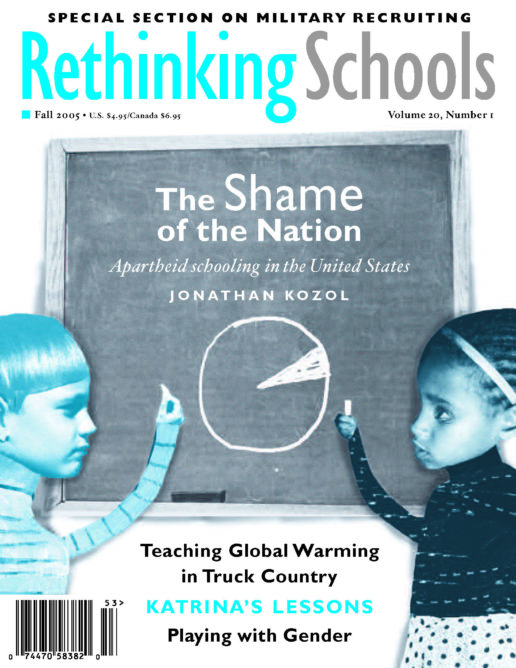Film: Inspiration From Mexico’s Rank and File
Granito de Arena (Grain of Sand)
Director: Jill Friedberg
Corrugated Films, 2005
DVD. 60 min.
“When we hold a picket line we’re lucky to get a couple dozen people,” said Ryan Simms, a young teacher union leader from Elgin, Ill, after he saw the film Granito de Arena. “But down in Mexico they have thousands of teachers at their demonstrations! It’s amazing!”
Ryan was attending a teacher union workshop in Minneapolis and had just viewed the film, which tells the story of Mexican teachers resisting the pressures of corporate globalization and privatization and their struggle for union democracy.
Tim Kraus, a teacher leader from Cincinnati, said he plans to use the film with his ninth graders who attend a small school that grooms future teachers. He thought the film would hold students’ interest and teach them lots about both “teacher unionism and the global situation.”
Jill Friedberg, a Seattle-based filmmaker, also made This Is What Democracy Looks Like, about the 1999 World Trade Organization protests in Seattle. In her new film, she covers a lot of territory, interspersing historical and contemporary film footage with short interviews and explanatory narration.
The film opens with stunning footage of Mexican government attacks on a rural teachers’ college in the state of Chiapas. Students, families, and teachers mount a valiant—but ultimately unsuccessful—defense. As one speaker says at a rally in Mexico City, “All [the rich and the government] want is for schools to prepare a workforce that they can exploit in sweatshops.”
This footage sets the stage for much of the rest of the film. The Mexican government, burdened by foreign debt and pressured by international financial institutions to implement “neo-liberal” or “structural adjustment” reforms, has instituted cutbacks and privatized public services. And rank-and-file teachers have fought back. The resistance has spanned more than 35 years, and involves fighting against repression, sometimes lethal, from both the Mexican government and the well-entrenched bureaucrats who have dominated the Mexican teachers’ union for decades. Nearly 150 teacher union activists have been murdered over the recent decades. A central demand of the reform movement has been that union leadership be held accountable for past actions, including the deaths of militants, and that the union structure be democratized.
Despite the brutal repression, the story of this rank-and-file teachers’ reform movement is inspiring. Their demands are basic: a living wage for teachers, better schools, free breakfasts, and free textbooks for students. But the teachers exhibit a deep understanding of the economic forces that are pushing the privatizing agenda, and they use creative tactics to educate the public about what’s going on.
In one scene, teacher activists take over toll stations for a privately run freeway. Until they are confronted by phalanxes of Mexican police, the teachers allow the cars and trucks to pass freely, passing out leaflets about the dangers of privatization and collecting donations for their struggle.
It’s refreshing that even the union reform movement is not immune from criticism in the movie. Activist teachers explain how they need to deepen ties to the community and ensure that the democracy they are demanding in the union and in the streets translates to more democratic practices within their own classrooms.
Without lots of background, some of the film will be tough going for most high school students. But for teachers considering how our work and lives here connect to teachers’ work and lives in Mexico, Granito de Arena is unparalleled. As Friedberg chronicles increased privatization, standardized testing, cuts in funding, and curriculum standardization, it’s hard to escape the creepy feeling that here and in Mexico, all of us are part of the same scheme to turn education into “human capital development,” in the words of Mexican President Vicente Fox.
Toward the end of the film, the brilliant Uruguayan writer Eduardo Galeano suggests that in the era of aggressive global capitalism, teachers of conscience must not merely be good classroom practitioners, but also social activists: “There is an old proverb that says it’s better to teach someone to fish than to give them fish. But what if they sell the river or what if they poison the river? And what good is it to know how to fish if the owner of the river doesn’t let us fish? In other words, education is unavoidably, fatally linked to all other aspects of life.”
Granito de Arena concludes with activists calling for a globalization of solidarity, and for the radicalization of the teaching profession. As teachers around the world are confronted with such relentless attacks on public schools, these calls sound more like common sense than rhetoric. This film will undoubtedly help nurture this solidarity.

